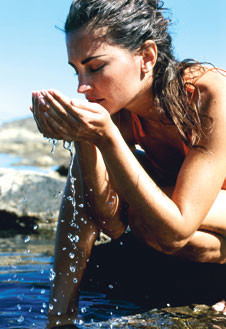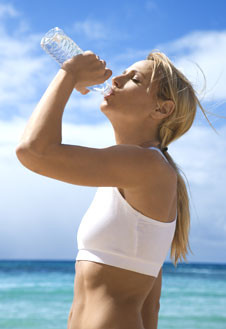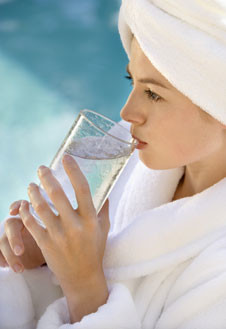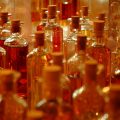 Water harm and benefit A person needs at least 1.5liters of water a day is a truth that is firmly rooted in our heads. Years have passed, much water has flowed under the bridge, and now two researchers from the University of Pennsylvania in Philadelphia have proven that this golden rule is wrong. No matter how much they studied scientific publications on this topic, they could not find a single study that could confirm the benefits of drinking a bottle of water a day. Thus, one of the unshakable postulates collapsed. And what about the rest? Experts answer our questions.
Water harm and benefit A person needs at least 1.5liters of water a day is a truth that is firmly rooted in our heads. Years have passed, much water has flowed under the bridge, and now two researchers from the University of Pennsylvania in Philadelphia have proven that this golden rule is wrong. No matter how much they studied scientific publications on this topic, they could not find a single study that could confirm the benefits of drinking a bottle of water a day. Thus, one of the unshakable postulates collapsed. And what about the rest? Experts answer our questions.
Drinking plenty of water helps the kidneys work.
Wrong.The kidneys work on their own and do not need to be cleansed of waste. On the contrary. “Excessive water consumption can be harmful,” says nephrologist Pierre Ronceau. To maintain a constant volume of fluid in the body, the kidneys can reabsorb some of the water that they have already filtered. They provide fine regulation of the volume and concentration of urine. “The more a person drinks, the less the kidneys have to save and, accordingly, reabsorb water,” explains Pierre Ronceau. “The tubules designed for this are used less and less and become unaccustomed to working.” As a result, in extreme heat and heavy physical exertion, when the body needs to save water, the reabsorbing tubules will cope with their work worse.
Drinking plenty of fluids protects against urinary tract infections.
Wrong.If the infection is already present, it is recommended to drink a lot to increase the dilution of urine. This reduces the concentration of pathogens in the bladder and makes it empty more often. But increased water consumption does not prevent infection. "To avoid infection, you must first of all monitor intimate hygiene. And women who are prone to frequent urinary tract infections are advised to urinate after intercourse," Pierre Ronso reminds.
Water does not contain calories.
 Right.But only if you drink water in its pure form, without additives. Some drinks look like water in color, but they are flavored. If you carefully read the label, you may find that some “waters” contain 20 calories per liter. Of course, if you add sugar-containing syrup to the water, the calorie content will increase.
Right.But only if you drink water in its pure form, without additives. Some drinks look like water in color, but they are flavored. If you carefully read the label, you may find that some “waters” contain 20 calories per liter. Of course, if you add sugar-containing syrup to the water, the calorie content will increase.
Water removes toxins
Wrong.Urine helps rid the human body of urea, as well as some toxic substances and medications. But water does not affect the removal of toxins. No matter how much liquid is processed, the kidneys retain the molecules the body needs and let the rest through. Urine will simply have a higher or lower concentration. So if we drink more, the water circulating in our body will not become cleaner.
Drinking plenty helps to lose weight.
Wrong.“Water does not dissolve fats or sugars and does not cause fat loss,” says nutritionist Arnaud Badevent. “It is simply a symbol of purification used in marketing.” If nutritionists tell their patients not to forget to drink, it is only to avoid reducing their water intake by reducing their calorie intake. “And if someone cannot do without a bottle of water when on a diet, it is more likely to be because they want to suppress their hunger,” he explains. “It is a kind of ritual.”
In the plane you have to force yourself to drink
True. Just like in an overheated room.The air in the airplane cabin is under pressure, so it is extremely dry. This is one of those situations where the mechanism that regulates the feeling of thirst is disrupted. So it is better to drink before you feel thirsty.
Water is rich in mineral salts
 Right.The composition of water varies depending on the region and the rocks it passes through before reaching your glass. Sometimes water contains more sodium, sometimes magnesium or potassium. In any case, the content of mineral salts should not exceed a certain level. It is better not to overuse water with a high fluoride content: if consumed too often, it increases the risk of developing fluorosis, which contributes to the demineralization of bones.
Right.The composition of water varies depending on the region and the rocks it passes through before reaching your glass. Sometimes water contains more sodium, sometimes magnesium or potassium. In any case, the content of mineral salts should not exceed a certain level. It is better not to overuse water with a high fluoride content: if consumed too often, it increases the risk of developing fluorosis, which contributes to the demineralization of bones.
It is better not to drink while eating
Wrong."For the stomach to work well, it needs moisture," reminds Christian Bustier. "And mixing of food goes better if you drink a little liquid during lunch." Drinking during meals helps digestion, especially if the water is rich in bicarbonates. In case of constipation, doctors recommend increasing water intake somewhat.
When a person drinks a lot, it can be a sign of illness.
True. Potomania is a mental illness in which the patient drinks liters of liquid without feeling thirsty. It is similar to bulimia, when the patient eats a lot without feeling hungry.
To get the required amount of water, it is enough to simply quench your thirst
Right.Thirst is a very precise signal for regulating water balance. It encourages drinking. Then the kidneys, sweating system, etc. are involved, regulating the water level in the body. If there is little water, a person will sweat little, and the urine will become very concentrated. If a person drinks a lot of water, the urine will be more abundant and lighter. Some people are water drinkers by nature, but, as a rule, one cup of liquid in the morning and two glasses at lunch and dinner is enough. Food, especially fruits and vegetables, will finally replenish the water deficit. A special situation only with infants and the elderly, in whom the process of thirst formation may be disrupted.
Bottled water is better than tap water
 Wrong.Any water intended for drinking is checked several hundred times a day. It should not contain even traces of pathogenic bacteria. The content of iron, pesticides, sulfates is strictly regulated, as is the concentration of mineral salts. If you drink bottled water, try to use it immediately after opening and store it in a cool place. Some studies have shown that individual components of polyethylene terephthalate (PET) can enter the water.
Wrong.Any water intended for drinking is checked several hundred times a day. It should not contain even traces of pathogenic bacteria. The content of iron, pesticides, sulfates is strictly regulated, as is the concentration of mineral salts. If you drink bottled water, try to use it immediately after opening and store it in a cool place. Some studies have shown that individual components of polyethylene terephthalate (PET) can enter the water.
Chlorinated tap water
Right.Chlorine helps protect water from contamination as it passes through water pipes. When you come out of the tap, the water contains approximately 0.1 mg of chlorine per liter. According to WHO standards, there is no health risk at concentrations of up to 5 mg/l. To get rid of the characteristic smell, just put the container of water in the refrigerator for a few hours.
Plastic bottles make it more environmentally friendly
Right.The weight of a 1.5-liter bottle has fallen from 38.8 g in 1997 to 33.7 g in 2003. But during this time, bottled water consumption has increased by about 35%. So when we drink tap water, we care about the environment. “Bottled water adds about 10 kg of waste per person per year,” the French Ministry of Ecology reports on its website. And it costs 100-300 times more.









